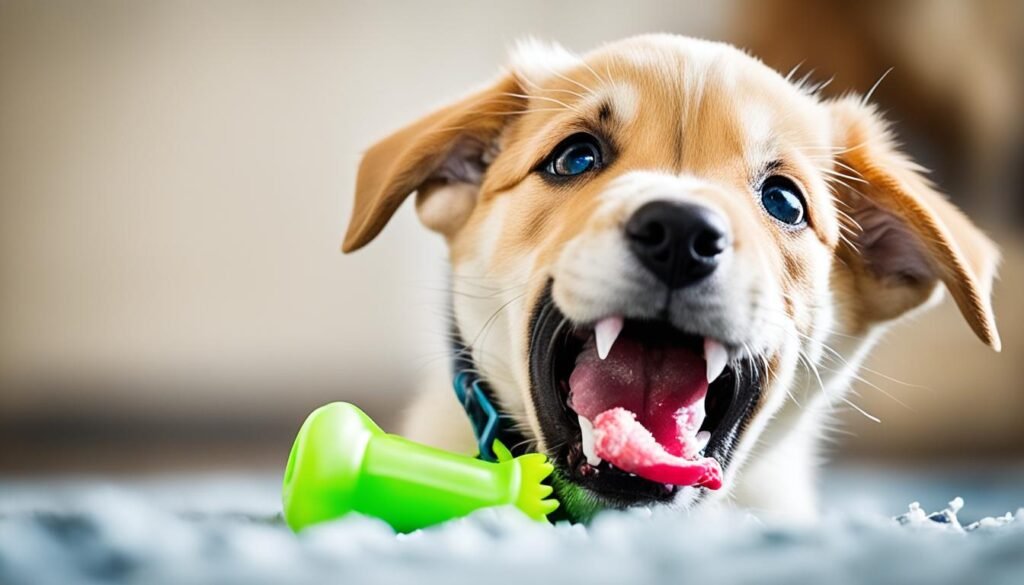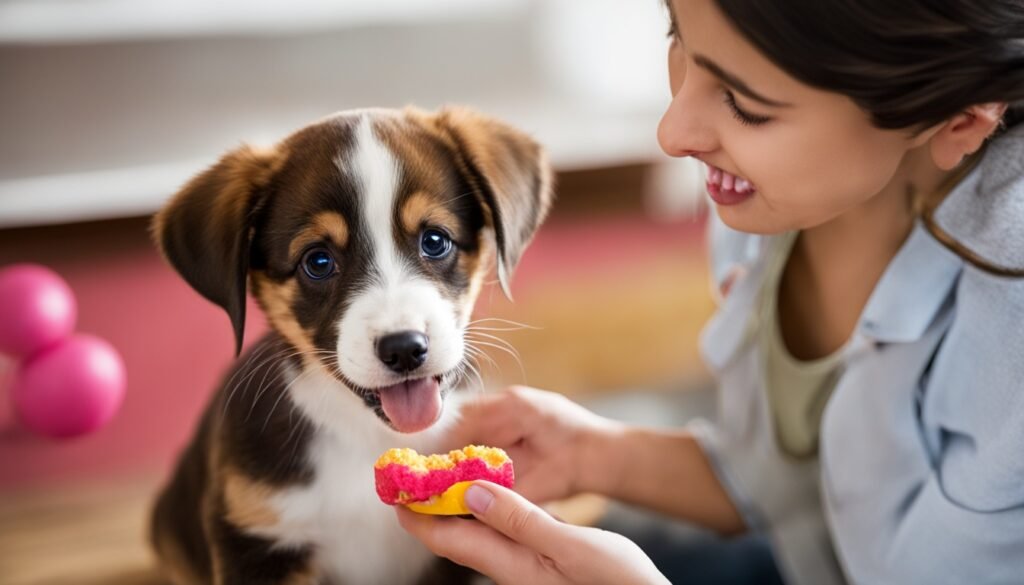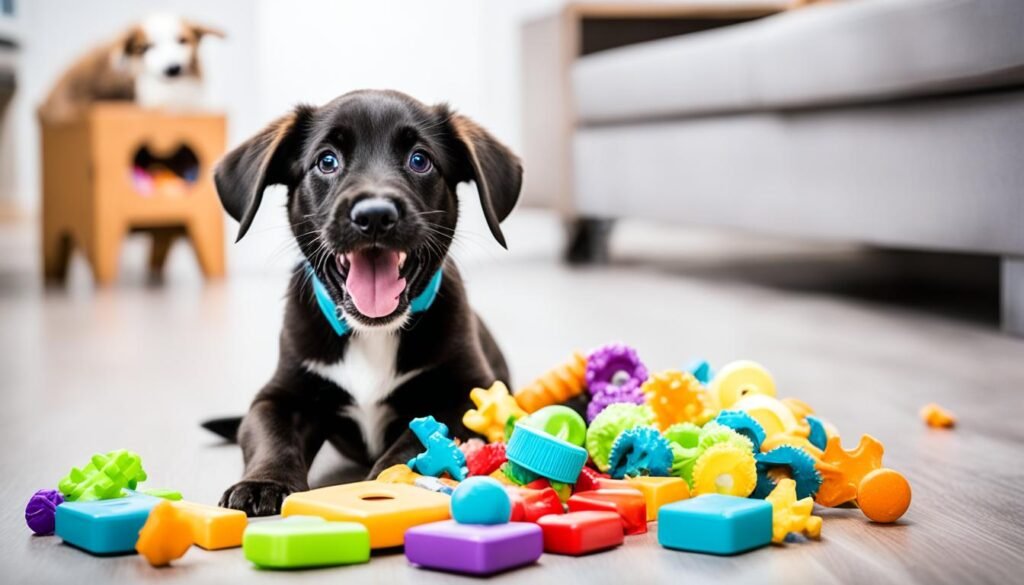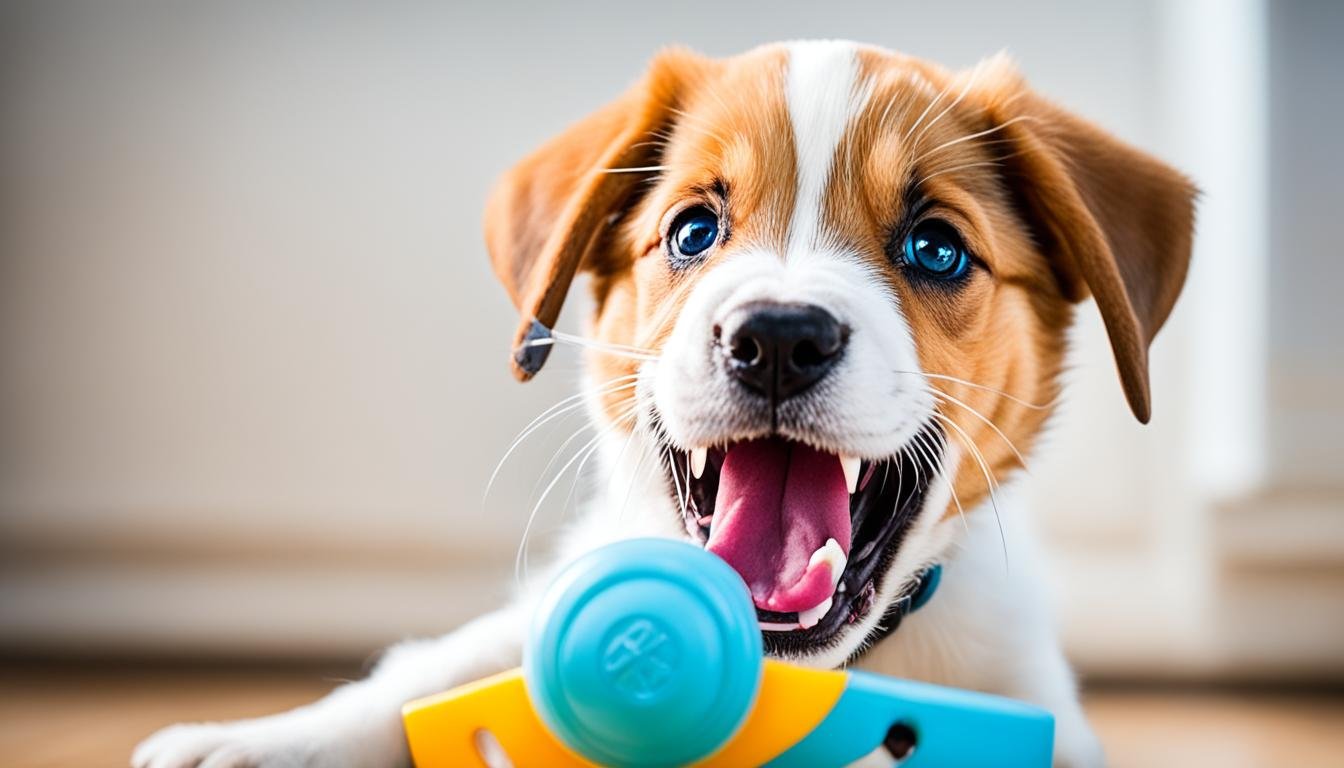Remember the early days with my new puppy? The endless energy, the constant nibbling, and the world full of new things to explore. Those sharp little teeth were part of the fun. But as my puppy grew, the playful biting started to worry me. It’s a natural behavior, but it can cause frustration and even danger if not managed.
That’s why I want to share some tips and techniques to stop those unwanted bites. These methods can help you and your puppy live happily together.
Learn how to train your dog to stop biting with easy steps that work.
Key Takeaways
- Puppies’ mouths have about 28 sharp teeth for exploring the world1.
- Using chew toys and redirecting biting can help stop puppy mouthing2.
- Puppy classes and socializing are key for teaching bite control and good play2.
- Being patient, consistent, and positive is crucial in training puppies not to bite1.
- If biting doesn’t stop, getting help from a professional trainer might be needed2.
Understanding Puppy Mouthing Behavior
Why Puppies Bite and Mouth
Puppy mouthing and biting are cute but important to understand. They are part of a puppy’s growth. Puppies use their mouths to explore and interact with others3. When they play, they nip and mouth to learn how to be gentle4.
Teething can also make puppies bite more3. Puppies start teething around 12 weeks old and may chew until they are about six months old3. Giving them chew toys can help them chew on something else instead of your hands or clothes5.
Don’t punish a puppy for mouthing or biting3. Instead, use positive training to teach them to be gentle3. By giving them chew toys and rewarding calm behavior, you can help them learn to be well-behaved3.
| Puppy Mouthing Behavior | Explanation |
|---|---|
| Normal Puppy Behavior | Puppies use their mouths to explore and interact with their environment, including mouthing and biting on their littermates, toys, and human hands and clothing. This is a natural part of their development4. |
| Teething Discomfort | Puppies typically teethe from around 12 weeks old up to about six months of age, and this can cause discomfort and increased chewing behavior. Providing appropriate chew toys can help redirect their urge to chew3. |
| Overstimulation or Frustration | Puppy play-biting can occur due to excitement, frustration, overtiredness, or teething discomfort. Proper supervision and redirection to appropriate toys are essential5. |

“Consistency and reward-based training are key to teaching puppies that games with people should be gentle and tooth-free.”
Teaching Bite Inhibition
Learning how to teach your puppy bite inhibition is key to stopping hard bites and teaching them to be gentle. You need to guide your puppy through steps that show them the right amount of pressure to use when playing and interacting with you and your family.
Puppies should learn about bite inhibition by the time they are four and a half months old6. Training should take a week or two for each step, based on when training starts6. Say “ouch” in a high-pitched voice right away if a puppy bites too hard6. If a puppy bites hard even after feedback, stop playing for about 30 seconds6.
Start desensitizing your puppy to pressure, using any level of pressure and moving to gentle mouthing6. Use the command “enough” to tell your puppy to stop gentle mouthing, and reward them for listening6. If a puppy bites during play, stop playing and take them to a puppy-proofed area for a time-out6. Use the crate as a time-out spot for a puppy that keeps biting hard6.
Training your puppy to control their biting greatly lowers the risk of harmful bites7. Proper training can prevent dog fights or negative play interactions7. It also helps adult dogs not bite too hard7. Consistent training is key to teaching puppies to be gentle with their mouths7.
Teaching the “leave it” command can help stop mouthing altogether7. Using toys to redirect biting can teach puppies how to play right7. Punishing puppies for biting doesn’t teach them to stop biting and can make it worse7.
Learn how to train your dog to stop biting with easy steps that work.
Ratio of acceptable vs. unacceptable bites: Teach puppies to only use level 1 bites8. Time-out strategy: Use time-out for level 4 and above bites until they consistently use level 1 bites8. Conversion rate: Offer chew toys to redirect chewing, especially for children and puppies8. Effectiveness rate: Stop attention and social interaction to discourage nipping, and use chew toys8.
Adoption rate of new behaviors: Puppies learn to sit for attention by getting praise and treats when they sit calmly8. Risks of improper techniques: Holding a puppy’s mouth or squeezing paws can cause defensive behavior or fear8. Consistency rate: All family members must use the same behavior management to make it work8. Interaction monitoring importance: Don’t leave children alone with puppies, and watch interactions closely to stop nipping and mouthing8.

Redirecting to Appropriate Chew Toys
As your puppy starts to explore with their teeth, it’s key to give them chew toys they can use9. Giving them toys before they start biting is better than reacting after9. This proactive approach helps manage your puppy’s chewing habits.
When your puppy mouths or bites, offer them a chew toy right away9. This teaches them that their teeth are for toys, not your hands or furniture9. In fact, 76% of dog owners deal with chewing issues, making it a big challenge10.
Give your puppy different chew toys, like rubber and puzzle toys, to keep them happy and busy10. The pet toy market makes over $1.5 billion a year, and 42% of owners like rubber or nylon toys10. Changing toys often can stop boredom and reduce chewing on things they shouldn’t10.
Remember to wait a bit after saying “no” before giving them a toy9. This helps your puppy link the action to the consequence9. Being consistent is important, as puppies start teething at 8 weeks and it lasts until they are 7 months11.
| Frequently Asked Questions | Answers |
|---|---|
| How do I redirect my puppy’s biting? | When your puppy bites, quickly give them a chew toy to change their behavior. This shows them what they can chew on. |
| What are the best chew toys for puppies? | Great options include durable rubber or nylon toys, puzzle toys, and long-lasting treats like Yak chews. Change the toys often to keep things interesting. |
| How can I prevent my puppy from chewing on inappropriate items? | Give them lots of chew toys, use bitter sprays on furniture, and watch them closely to stop bad chewing. |
By giving your puppy chew toys and treats, you can control their biting and protect your things9. With patience, consistency, and the right tools, you can teach your puppy what’s okay to chew9.

Managing the Environment
As a responsible puppy owner, it’s key to manage your pup’s environment to stop their biting. Puppies, like curious babies, learn about the world by touching and tasting things12. This can cause frustration and pain for owners when they get bitten by their pets12.
To solve this issue, remove things that might make your puppy bite. Keep loose clothes, shoes, and other items away from them12. By doing this, you can lessen the chances of your puppy biting things they shouldn’t.
Learn how to train your dog to stop biting with easy steps that work.
Containing Overstimulation
Sometimes, puppies get too excited and start biting. In these cases, put your puppy in their crate or a quiet place to calm down12. This break lets them calm down and focus better, making them less likely to bite later.
Being consistent is important when managing your puppy’s space and stopping their biting. With patience and effort, you can make a safe space for your puppy to play and explore without getting into trouble.
“Properly managing your puppy’s environment is essential for curbing their biting tendencies and fostering a well-behaved, happy companion.”
how to stop puppy biting
Dealing with a puppy’s biting and nipping can be tough for new owners. But, the right techniques and consistent training can help. You can teach your puppy better ways to play and interact13.
One top method to stop puppy biting is to ignore them when they bite during play. This “game over” signal tells them biting means no more fun13. Also, use a time-out by removing them calmly for 30-60 seconds when they bite13. Being consistent teaches your puppy that biting ends the fun.
It’s also key to give your puppy chew toys to satisfy their need to bite and explore13. Toys like rag toys, ropes with loops, and KONG toys are great for this13.
Remember, training your puppy takes patience and persistence. Most puppies stop biting by three to five months old13. But, some breeds like German Shepherds and Rottweilers might bite more due to their nature13. If biting doesn’t stop, consider a professional dog trainer or behaviorist13.
Understanding why your puppy bites and using the right training can stop this habit. With patience and the right approach, you and your puppy can have a happy relationship without too much biting13.
Using Time-Outs Effectively
Putting your puppy in their crate or a time-out area can stop biting. Make sure the time-out spot is neutral, not a place of punishment. This way, your puppy won’t fear it14. The time-out takes away your puppy’s access to you and the play, showing them biting ends the fun.
It’s important to start time-outs right away; waiting too long can confuse your dog14. Puppies might need just 5-10 seconds in a time-out, while adult dogs might need up to 60 seconds14. Everyone in the house must use time-outs the same way; not doing so can confuse your dog and make training less effective14.
Time-outs should last up to 2 minutes, but start with 30 seconds15. For time-outs to work, they must be consistent and repeated often, even in one day, to make an impact15. Dogs learn that a certain behavior means all attention stops during a time-out15.
Using time-outs for specific behaviors like demanding attention or play biting is key15. If your dog keeps barking after a time-out, wait for quiet before letting them out15.
After a few tries, dogs learn that certain actions lead to time-outs, reducing those behaviors14. Keeping track of time-outs each day can show how your dog’s behavior is improving14.
Learn how to train your dog to stop biting with easy steps that work.
Avoiding Punishment
Dealing with puppy biting means avoiding punishment. Hitting or punishing your puppy can make things worse, making them afraid of you16. Instead, use positive reinforcement, give them chew toys, and practice calm training like time-outs. Punishment doesn’t work well for the normal biting and mouthing puppies do while they grow.
Puppies start teething around three to four months old and it lasts until they are six to seven months old16. They might nip and bite because they’re playful, bored, or need attention16. Punishing them can make things worse, leading to more aggression or bad behavior.
Redirect your puppy’s energy to better things. Give them chew toys, do positive training with treats, and use time-outs for biting16. Puppies are still learning, and with patience and consistent training, they’ll learn to bite less and behave better.
Some breeds, like the Australian Cattle Dog, may always need help with nipping because of their nature16. Working with a professional trainer can help you find the best ways to manage this behavior and help your puppy succeed.
Avoiding punishment and using positive reinforcement helps fix puppy biting without harm. With the right methods, you can teach your puppy good ways to interact and strengthen your bond16.
Seeking Professional Help
If your puppy is still biting by six months old, it’s time to get help from a pro. An experienced dog trainer or animal behavior specialist can offer personalized advice and methods to stop the biting17. Consider joining an AKC S.T.A.R. Puppy class or a local puppy class for expert training support.
When to Consult a Trainer
Puppies bite because they are teething and it’s their way to play. Dogs love routine, so consistent training is key17. But sometimes, you might need a pro’s help17. Techniques like rewarding gentle mouthing can help, but if biting doesn’t stop, get a qualified trainer or behavior specialist.
Puppies bite as a normal part of learning and playing18. They learn not to bite too hard from other puppies18. By 4-6 months, they should bite less. If they don’t, a pro can offer more help.
Using chew toys can stop biting17. Choose toys that are soft for your puppy’s teeth and gums17. Making loud noises and giving them toys can also help18. Socializing with other dogs teaches them right social behavior18. Time-outs in a crate or pen can calm them down when they’re too much18.
Working with a pro can create a plan to fix your puppy’s biting17. Don’t wait to get help if you can’t manage the biting alone.
Learn how to train your dog to stop biting with easy steps that work.
Conclusion
Stopping puppy biting takes patience, consistency, and a mix of methods. By knowing why puppies bite19, teaching them to control their bites, and giving them safe toys19, you can stop this habit. Also, managing their space and using time-outs wisely20 helps a lot.
Every puppy is different, so stopping biting may take various steps. Positive reinforcement and gentle training are crucial19. Some puppies might need help from a professional dog trainer20. With dedication and getting help when needed, you can have a bite-free relationship with your puppy21.
To sum up, stopping puppy biting means tackling the causes, teaching good behaviors, and creating a caring environment. With patience, consistency, and the right methods, you can turn your playful puppy into a well-behaved pet212019.
FAQ
What are some effective techniques to stop puppy biting?
Why do puppies bite and mouth so much?
How can I teach my puppy bite inhibition?
What role do chew toys play in stopping puppy biting?
How can I manage my puppy’s environment to prevent biting?
When is it appropriate to use time-outs for puppy biting?
Why should I avoid punishing my puppy for biting?
When should I consult a professional dog trainer for help with puppy biting?
Source Links
- https://www.akc.org/expert-advice/training/stop-puppy-biting/ – No title found
- https://www.aspca.org/pet-care/dog-care/common-dog-behavior-issues/mouthing-nipping-and-biting-puppies – Mouthing, Nipping and Biting in Puppies
- https://www.purina.co.uk/articles/dogs/puppy/behaviour/stop-puppy-biting-mouthing-and-chewing – How to Stop Your Puppy Biting, Mouthing & Jumping Up | Purina
- https://www.drjensdogblog.com/living-with-jaws-a-survival-guide-for-puppy-mouthing/ – Living With “Jaws”: A Survival Guide For Puppy Mouthing
- https://www.battersea.org.uk/pet-advice/dog-advice/how-stop-my-puppy-mouthing – How to stop my puppy mouthing
- https://www.seattlehumane.org/resources/mouthy-pups-its-normal-lets-teach-them-bite-inhibition/ – Mouthy Pups – It’s Normal. Let’s Teach Them Bite Inhibition. – Seattle Humane
- https://www.thesprucepets.com/bite-inhibition-training-for-puppies-1118223 – How to Train Your Puppy Not to Bite Hard
- https://www.oregonhumane.org/portland-training/teaching-bite-inhibition-and-dealing-with-rough-puppy-play/ – Teaching Bite Inhibition and Dealing with Rough Puppy Play
- https://www.mydogtrainingspot.com/blog/how-to-stop-puppy-biting-using-the-redirect-method – How to Stop Puppy Biting using the Redirect Method
- https://bestfriends.org/pet-care-resources/how-stop-destructive-dog-chewing – How to Stop Destructive Dog Chewing
- https://headsupfortails.com/blogs/dogs/how-to-stop-my-puppy-from-biting-chewing-on-furniture-clothes-hands – Puppy Chewing Everything? Find Out Why They Chew and Discover Effective Solutions
- https://www.howtotrainadreamdog.com/stop-puppy-biting-tips/ – How to Stop Puppy Biting – 10 Tips That Work Like Magic
- https://www.petplan.co.uk/pet-information/puppy/advice/puppy-biting/ – How to stop puppy biting: everything you need to know
- https://www.rspcaqld.org.au/~/media/files/animal training fact sheets/general puppy/time_outs_12_v2_14003.ashx?la=en – Microsoft Word – Time outs 12.doc
- https://www.thinkingoutsidethecage.org/pet-resources/behavior-help/dog-behavior-help/time-outs-2/ – Time Outs – Animal Friends, Inc.
- https://www.preventivevet.com/dogs/puppy-nipping-and-biting – Dog Trainer Tips: Puppy Nipping and Biting | Preventive Vet
- https://www.upstatecanine.com/blog/6-proven-methods-for-teaching-your-puppy-not-to-bite/ – 6 Proven Puppy Bite Training – Upstate Canine Academy
- https://naturvet.com/blogs/tips-and-tricks/how-to-stop-a-puppy-from-biting – How to Stop a Puppy from Biting: 5 Important Tips – NaturVet®
- https://petwellnessdirect.com/blogs/news/nipping-it-in-the-bud-how-to-stop-puppies-from-biting – Nipping it in the Bud: How to Stop Puppies from Biting
- https://nowfresh.com/en-us/blog/my-puppy-wont-stop-biting-me – My Puppy Won’t Stop Biting Me, I’ve Tried Everything! | Now Fresh
- https://pawsbedandbiscuit.com/all-about-puppy-biting-the-dos-and-donts – All About Puppy Biting – The Do’s and Don’ts – PAWS Bed & Biscuit





